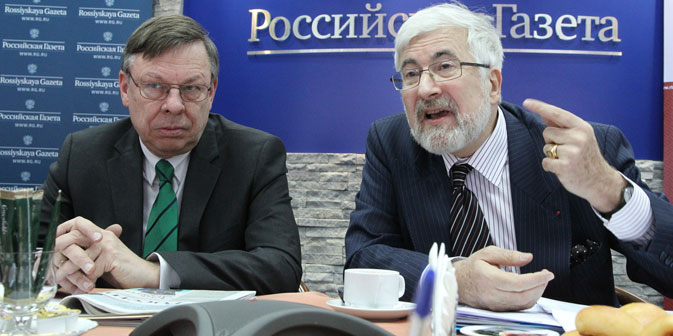
French ambassador Jean de Gliniasty and his German counterpart Ulrich Brandenburg (L-R) at Rossiyskaya Gazeta’s Moscow headquarters for a business lunch dedicated to the 50th anniversary of the Elysée Treaty. Source: Rossiyskaya Gazeta / Victor Vasse
The eurozone crisis increases the importance of Russia for the EU economies, according to French ambassador Jean de Gliniasty and his German counterpart Ulrich Brandenburg.
The ambassadors sat down together at Rossiyskaya Gazeta’s Moscow headquarters for a business lunch dedicated to the 50th anniversary of the Elysée Treaty.
A weaker West would hurt Russia
Russia-EU negotiations lost in translation
“We do not have statistics available for the last year yet, but I do know that Russia is of great importance for Germany as a trading partner. We see new highs in the trade area every year,” the German diplomat said, when asked by RBTH about whether the importance of Russia to the EU is increasing in economic terms against the European debt crisis.
“There are economists, even, who believe that one of the conditions for the EU to come out of the crisis is the successful cooperation with Russia. This is certainly true for France,” Ambassador de Gliniasty said in turn.
Russia is the EU's largest trading partner, after the U.S. and China. According to the European Commission, in 2011, the trade between the EU and Russia reached record levels. The volume of imports from Russia to the 27 EU member countries amounted to €198 billion ($266 billion), while exports totaled €108 billion ($145 billion).
As for Germany in 2011, according to Ambassador Brandenburg, the trade between the two countries reached €75 billion ($100 billion).
“We expect that, in 2012, there will be a new record with a plus – around 10-15 percent," Brandenburg said. "Russia, again, is a major partner in the trade and economy area. Thousands of German companies today are represented in Russia. There are German investments in Russia, direct investments are made, and investments volume is growing.”
Meanwhile, the French ambassador said that, in 2011, the trade between his country and Russia had not increased significantly, due to some reduction of gas imports from Russia.
“But French exports rose sharply in Russia. In particular – and this makes us happy – in new technology and high-tech areas,” de Gliniasty said.
According to the French Embassy in Moscow, France was the world's eighth and Europe’s third biggest exporter to Russia (after Germany and Italy) in 2011. The trade turnover between the two countries, which declined due to the 2009 crisis, was restored in 2010 and grew by 15 percent in 2011.
“Another area that I think is important to mention is that the French government is eager to attract Russian investments in France,” the French diplomat said.
The ambassador called the 2010 acquisition of the French Sambre et Meuse casting company by Uralvagonzavod (Russia's largest producer of cars and tanks) an example of Russian investments in the French economy.
In addition, de Gliniasty noted Russian Railways’ purchase of 75 percent shares of the GEFCO logistics company (a subsidiary of PSA Peugeot Citroen car manufacturer) at the end of 2012.
“Russia is becoming increasingly important for the economy of the European Union ... because the EU is currently undergoing a crisis,” the French diplomat said. “The crisis is a great opportunity to strengthen economic integration between Russia and the European Union as a whole.”
In general, the two diplomats expressed confidence in both Europe overcoming the crisis and the euro not being in danger.
“I have no doubt that we will overcome the present euro crisis. This is a debt crisis. Measures that have been adopted over the past two years show that we are on the right track,” Brandenburg said.
The French ambassador also drew attention to the fact that “the fundamentals of the EU economy and the eurozone are secure and reliable.”
“If one analyzes the euro over the recent years, he has no way to imagine that anything threatens that currency," de Gliniasty said. "That is, the debt crisis has in no way become a euro crisis. Thanks to the negotiations that took place between France and Germany – they were not easy, but constructive – we succeeded to create a number of mechanisms that strengthened the European Union.”
Thus, the two diplomats believe that, even 50 years after the conclusion of the Elysée Treaty that recognized the postwar reconciliation between Germany and France and became the cornerstone of a united Europe, the cooperation of the two leading European powers is still relevant.
“The EU remains an organization based on consensus," said Brandenburg. "All of its members are well aware that, if there is agreement between the French Republic and the Federal Republic of Germany, it is very important for the further development of the European Union. If Germany and France have a common opinion, it means progress for the European Union. If they are of different opinions, it means stagnation."
All rights reserved by Rossiyskaya Gazeta.
Subscribe
to our newsletter!
Get the week's best stories straight to your inbox